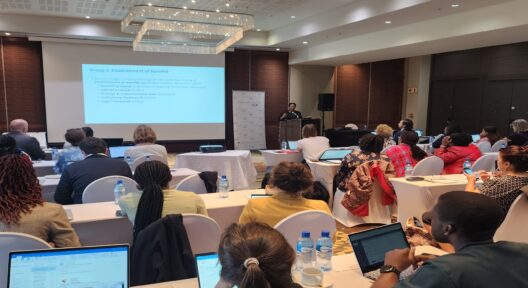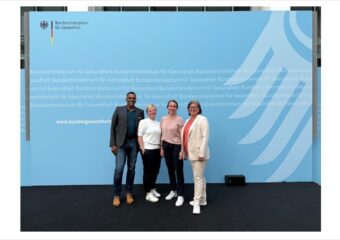Kick-off and Planning Meeting for the Namibia-RKI Twinning Project Phase II
Project-relevant stakeholders convened to kick-off Phase II of the Twinning Project and to plan activities that support the establishment of the Namibia Public Health Institute.

The Namibian Ministry of Health and Social Services (MoHSS) and Robert Koch Institute (RKI) have maintained a close and trusting cooperation since the successful start of the Namibia-RKI Twinning Project (TwiNit) in 2020. Further project partners are the Namibia Institute of Pathology (NIP) and the University of Namibia (UNAM). The project is part of the Global Health Protection Programme (GHPP). It will continue during GHPP Phase II (2023 – 2025) under the name TwiNit 2.0. The long-term goal of the project is the establishment of the Namibia Public Health Institute (NamPHI).
Twinning projects are based on institution-to-institution relationships to achieve sustainable organisational capacity building through peers collaborating and solving tasks together. Close collaboration with various partners and interdisciplinary technical support from RKI will assist establishing the NamPHI by strengthening its core Public Health functions. The COVID-19 pandemic highlighted the urgent need for establishing a NamPHI that can efficiently coordinate the response to public health threats.
About 40 participants from project-relevant stakeholders convened in Windhoek in April 2023 for two days. They discussed where Namibia finds itself at present as far as the establishment of the NamPHI is concerned. Among them were MoHSS, RKI, NIP, UNAM, Africa Centres for Disease Control and Prevention (Africa CDC), WHO Country Office Namibia, US-Centers for Disease Control and Prevention (US-CDC), Friedrich-Loeffler-Institut (FLI), Ministry of Agriculture, Water and Forestry (Abbreviation) and the Central Veterinary Laboratory (CVL).
In her keynote speech, the Deputy Minister of Health and Social Services, Hon Dr Esther Muinjangue, confirmed the high-level political support towards the establishment of NamPHI. Dr Raji Tajudeen from Africa CDC addressed the delegates virtually. In his speech about founding public health institutes within the African Union, he reminded the participants, ‘It’s not a sprint but a marathon.’
The core of the meeting was a group exercise where the participants identified ways in which the following five technical project areas could best support the successful establishment of NamPHI. In particular, it involved working on project sub-goals, indicators and activities.
Technical project areas are:
- Establishment of the NamPHI,
- Epidemic preparedness and response,
- Non-communicable diseases and mental health,
- Public health laboratory support,
- Antimicrobial resistance and infection prevention and control.

Two main options for the establishment of the NamPHI were discussed. They included applying a 2-step plan for implementation: (1) first as a department within the MoHSS and (2) later as a semi-autonomous institute. It was noted that many activities could only be realised if the establishment of NamPHI was officially approved by the Namibian government.
The results of the group exercise will inform the operational planning of TwiNit 2.0. At the end of the meeting, the Twinning project lead Dr Andreas Jansen acknowledged the fruitful engagements of the two days. He said that the momentum has been re-ignited for moving forward with establishing the NamPHI.


